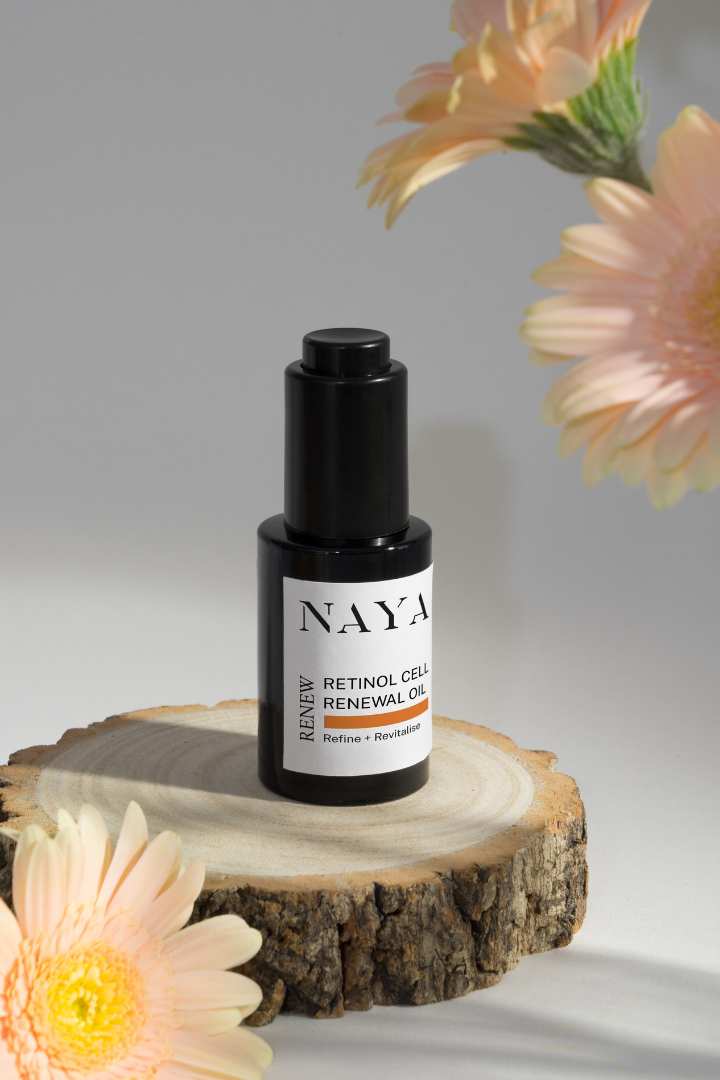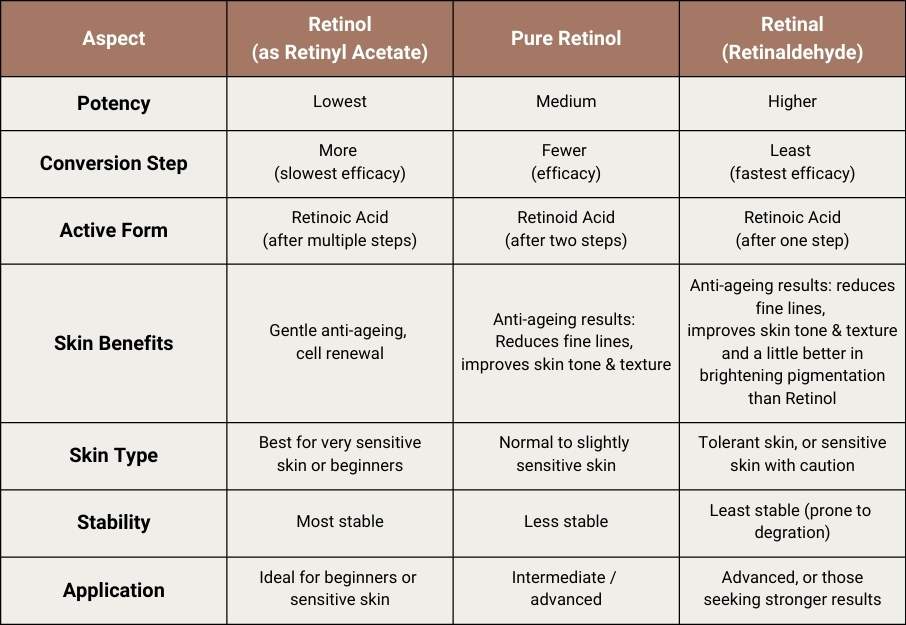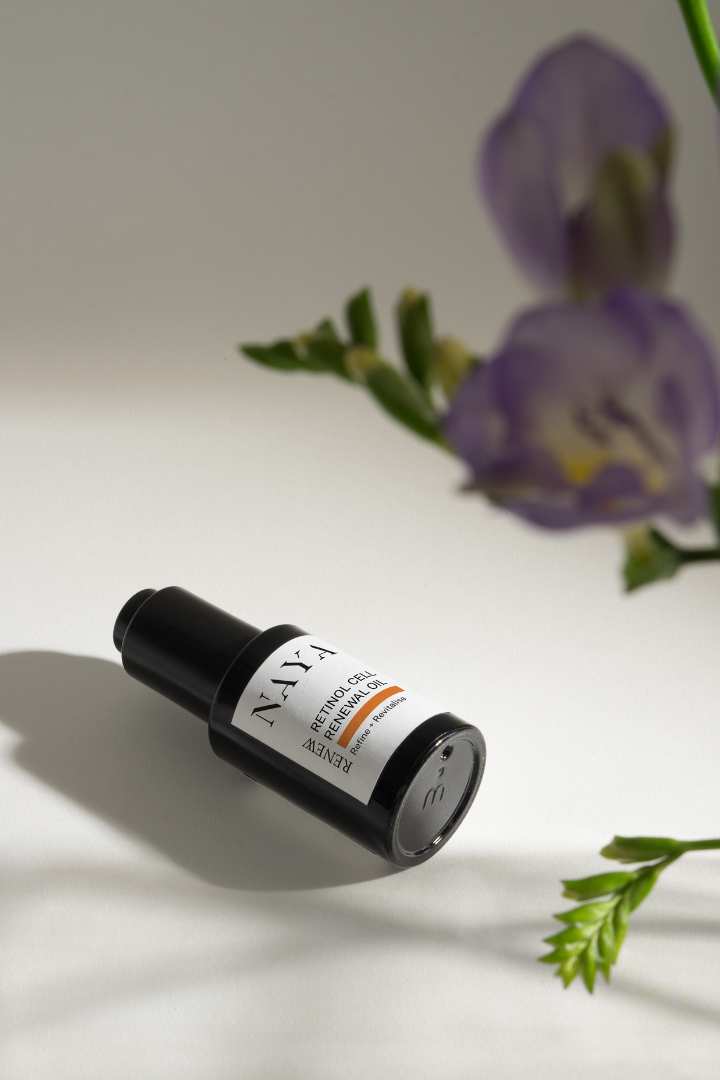Vitamin A (Retinol & Retinal) Skincare for Radiance & Renewal
1 product
1 product
Vitamin A is one of the most researched and effective ingredients in skincare. In the form of retinoids – including Retinol and Retinal – it helps refine skin texture, boost radiance, and target visible signs of ageing.
Both Retinol and Retinal work by stimulating cell renewal, supporting collagen production, and preventing collagen breakdown. This not only smooths fine lines and improves elasticity, but also accelerates the natural shedding of dead skin cells for a clearer, brighter complexion.
Whether your goal is to fade pigmentation, reduce breakouts, or reveal a youthful glow, our Vitamin A skincare collection offers gentle yet powerful formulas – including Retinal serums and retinol alternatives – designed for real results.
The difference between retinol and retinal lies in their effectiveness and skin compatibility. Retinal is more effective as an active ingredient . Retinal requires only a single conversion step, while Retinol must first be converted into retinal in the skin before it becomes the pure form of vitamin A. Thus people say Retinal is more effective than Retinol. But is it? It is assumed that it works faster and is considered more skin-friendly. However, in clinical studies it was mainly highlighted that Retinal works slightly more effective when it comes to pigmentation.
Retinol and Retinal help to increase moisture retention, which ultimately helps to reduce wrinkles and fine lines. Additionally, faster cell turnover reduces acne scars and pigmentation spots. Even antibacterial effects have been observed in cases of acne. As a result, vitamin A helps create a finer skin texture on the surface while providing a stable foundation beneath. As antioxidants, retinol and retinal counteract the harmful effects of free radicals and prevent premature skin aging. This is why vitamin A plays such an important role in well-aging care, as it inhibits collagen breakdown while simultaneously promoting collagen formation.
Retinol vs Retinal
Retinal and Retinol are both forms of Vitamin A. At first glance, you might have wondered if the 'a' in Retinal was a typo. In fact, Retinal is a distinct active ingredient. In our diagram, you can see the individual forms and their conversion steps. The rule of thumb is: the closer a substance is to retinoic acid, the more effective it is.



Retinyl esters (Retinyl Palmitate, Retinyl Linoleate, etc.) are precursors of Retinol that are converted into Retinol in the skin through a chemical reaction. They are the most tolerable retinoids but have relatively low efficacy because they require three conversion steps to become retinoic acid before taking effect in the skin. With each of these conversion steps, some of their potency is lost.
The most well-known retinoid, Retinol, is significantly more effective as it only requires two conversion steps to take effect: first to Retinal, then to retinoic acid, the bioavailable form of Vitamin A. However, higher concentrations - of 0.3% - are needed to maintain its potency. Therefore, it is recommended to gradually acclimate the skin to Retinol to avoid skin reactions (skin purging).
Retinal requires only one conversion step, making it more effective and quicker to reach the skin, while also being gentler. Its lower usage concentration prevents accumulation in the skin, reducing the risk of irritation. The conversion of Retinal to retinoic acid occurs exclusively through keratinocytes at a specific differentiation stage, ensuring controlled absorption of retinoic acid. Retinal is typically applied in a concentration of either 0.05% or 0.1%. But is it truly that much better than Retinol on its own?
The strongest retinoid is retinoic acid, also known as vitamin A acid or tretinoin. However, this form of vitamin A is prescription-only and therefore not allowed in the cosmetics market. The reason for this is that while retinoic acid is extremely effective against acne and sun-damaged skin, it also has a very high irritation potential for the skin and can only be prescribed under medical supervision.
Bakuchiol is a plant-based alternative to retinol and has little in common with real retinoids like retinoic acid, retinal, retinol, and retinyl esters. It is derived from the seeds of the Babchi plant, a medicinal plant from the legume family used in traditional Ayurvedic medicine. The chemical structure of bakuchiol differs significantly from that of retinol. However, it partially acts on the same cellular pathways in the skin. Some small short-term studies suggested that bakuchiol also has anti-aging properties but is less irritating than retinol. This is why bakuchiol is currently marketed in the cosmetic world as THE retinol alternative. Independent research on the anti-aging effects of bakuchiol is relatively limited compared to the over 40 years of research on real retinoids. However, the effect of bakuchiol on pimples and blemishes is better documented than the well-aging effects.
Both retinol and retinal improve and refine skin texture by stimulating cell renewal. They stimulate collagen synthesis and prevent collagen breakdown.
By increasing moisture retention, wrinkles and fine lines are reduced, skin elasticity is improved, and rapid shedding of dead skin cells is promoted.
Retinol and retinal accelerate cell renewal, leading to faster shedding of old skin cells. This helps the skin regenerate more quickly.
Through cell renewal and their sebum-regulating, antibacterial effects, inflammation is inhibited, and acne scars and pigmentation spots are reduced.

RETINOL RENEWAL CELL OIL
Our Retinol Renewal Cell Oil with the first 100% natural and encapsulated retinol effectively reduces lines and wrinkles, leaving the skin looking visibly finer and more even. Thanks to the encapsulation technology used, it is particularly gentle on the skin and ideal for introducing Vitamin A into your well-aging routine.
In our Retinol Renewal Cell Oil, we use the first biotechnologically derived retinol. It is highly effective and very well-tolerated. It stimulates the skin's natural collagen synthesis while inhibiting the enzyme responsible for collagen breakdown.
Retinol also visibly refines the skin texture, especially for acne scars or rough skin.
Compatibility & Interactions
If you have not used Vitamin A derivatives in your facial care before, you should be patient with your skin. Depending on the dosage, we recommend gradually increasing the application.
Start with just one retinol product, preferably the oil. Introduce the new active ingredient slowly to allow your skin to adjust. Give it time, as our skin also has a renewal cycle of 28 days. If you tolerate retinol well, you can upgrade for maximum results. We advise against combining with other retinol or retinal products, as you should always consider the overall concentration of the ingredients you apply to your skin.
We recommend not using our retinal products during pregnancy and breastfeeding.
No promo available.